The Return of the Underground Retail Cannabis Market?
Attitudes of Dutch coffeeshop owners and cannabis users to the proposed ‘cannabis ID’ and the consequences they expect.
ABSTRACT
The sale of cannabis to persons aged 18 or older is permitted in the Netherlands under certain conditions in commercial establishments called coffeeshops. The present Dutch government has proposed that access to coffeeshops be restricted to persons holding a cannabis ID, a mandatory membership card known colloquially as a ‘weed pass’ (wietpas). Recent interviews with 66 Amsterdam coffeeshop owners reveal that they expect mainly detrimental effects from the proposed measure. In particular, they predict customer resistance to compulsory registration, the discriminatory exclusion of tourists and other non-members, and a resurgence of cannabis street dealing. Two surveys of cannabis users (in a local sample of 1214 Amsterdam coffeeshop customers and a nationwide sample of 1049 last-month users) confirmed that many, but not all, users would oppose registration. The majority of respondents intended to look for other suppliers or to grow their own marijuana if the cannabis ID becomes law. Surprisingly, about one in ten said they would stop smoking cannabis.
Read more
Holland vs The Netherlands
Ireland and the European Economic and Monetary Union
 “A theory of capitalism that recognises the pluralist, multi-dimensional and internally conflicted nature of social systems restores politics to the central place it deserves, in contrast to efficiency theories in which politics is about no more than the instrumental problem of defining and implementing the most efficient institutions for the essentially technocratic task of coordination” (Wolfgang Streeck, 2010)
“A theory of capitalism that recognises the pluralist, multi-dimensional and internally conflicted nature of social systems restores politics to the central place it deserves, in contrast to efficiency theories in which politics is about no more than the instrumental problem of defining and implementing the most efficient institutions for the essentially technocratic task of coordination” (Wolfgang Streeck, 2010)
The financial crisis has called into question the capacity of national sovereign democratic states to reconcile the distributional tensions that emerge from capitalist market expansion. This problem has become particularly acute for countries of the Eurozone (De Grauwe, 2010, 2011). They cannot devalue their currencies and must adjust their economies through IMF-ECB induced structural reforms in labour, wage and fiscal policy. The problem of coordinating wage, fiscal and monetary policy in the interest of employment and economic performance, or capital accumulation, is not new. It was central to the construction of different variants of national incomes policies in European political economies during the neo-corporatist Keynesian era.
But how did domestic political actors respond to the adjustment constraints of globalised variants of capitalism during the neoliberal era, and what has been the trajectory of institutional change in European industrial relations and welfare regimes? This question guides the theoretical dimension of my PhD The Rise and Fall of Irish Social Partnership – The Political Economy of Institutional Change in European Varieties of Capitalism (2012) which is grounded on an argument that the politics of democratic capitalist change can be traced to the disorganisation and flexibilisation of institutions that enable labour to constrain capital. The decline in trade union strength and an increase in business power underpins the public policy paradigm shift from Keynesianism to neoliberalism across Europe. The role of the state in conditioning this pattern, and the diverse trajectory of change it invoked, is central to the study of comparative political economy. National labour market regulations have been flexibilised and the problem of employment resolved either through supply side reforms aimed at activation or low wage employment (Hall, 2011).
From Big Brother to Radical Decentralization
 In the past centuries governing has become more centralized, out of necessity and because it made the most sense. The state and its organizations, national as well as international, will not disappear as sources of power and government. However, they can no longer govern alone.
In the past centuries governing has become more centralized, out of necessity and because it made the most sense. The state and its organizations, national as well as international, will not disappear as sources of power and government. However, they can no longer govern alone.
Many things will have to be radically re-organized. Districts organize their own waste collection and every home is energy supplier. The adage for the next decennium will be: Radical Decentralization.
Sun and waste
Governed from Beijing and in its well-known particular brand of go getting, China is creating giant fields full of solar panels in the Gobi desert. The European Union has found the spirit after the accession of 10 new countries in 2004 and is getting ready to accept the rest of former Yugoslavia (Croatia, Bosnia and Herzegovina, Serbia, Montenegro, Kosovo and Macedonia) after the accession of Slovenia. The role of centralized government is far from played out. And yet a different trend marks the second decennium of this century: Radical decentralization, meaning organizing general interest issues on a micro scale. The size of the scale varies, and ends with the individual. Currently, individualism is not a popular term and brings to mind images of self-enriching bankers. That is one side of the coin. Thanks to the high level of education of for instance Western societies and ongoing technological advancements, we are more than ever capable of shaping our own lives, which creates great opportunities for the individual as well as for society at large. It does require changes from bureaucrats and administrators. In the next decade they will either have to adjust or make room for new ones.
Policy Games for Strategic Management
In the life of each organization, situations arise that are completely new to the history of the organization. These situations are complex, surprising, urgent, inspiring, threatening and sometimes enduring. Leadership is forced to bring the organization into uncharted territory. Facing these situations, and often after a period of muddling through in a business-as-usual way, leadership has to recognize that a breakthrough response will only emerge from a previously unexplored (and, for this organization, a revolutionary) strategy process. Think about the bewilderment in a high-tech company when an emerging technology from a competitor threatens the whole existence of their organization.
The California energy crisis in 2002 is another example: by initially oversimplifying the problem and failing to identify and evaluate major alternatives, the state found itself in a crisis of its own making. If there had been proper communication about this complex system among all interested parties (e.g. suppliers, regulatory agencies, distributors, and consumers), it is unlikely that the decisions made would have proven so unsatisfactory. Yet another instance is the dilemma faced by a nationalized railway or postal service – is deregulation an opportunity or a threat? Should they lobby against adoption of a new deregulation law, or pursue it as a great opportunity?
According to William Halal, who assessed the state-of-the-art of strategic planning in his study of 25 major corporations: “Issues can be thought of as stress points resulting from the clash between the organization and its continually changing environment. The magnitude of change is so great now that the social order has become a discontinuity with the past, creating a deep division between most firms and their surroundings that allows the environment to bear against the organization like a drifting continental plate. Issues comprise the societal hot spots that are generated at this stressful interface, forming social volcanoes that often erupt unexpectedly to shower the corporation with operational brush fires” (Halal, 1984, p. 252).
Two examples of such change are cited in the following pages. Suffice it to say that there is a class of macro-problems in uncharted territory which lead to “bet the organization” decisions.
How to Enter an Unknown Land?
Much has been written for leaders of organizations about the need to improve the quality of strategic decision making when one is faced with conditions of turbulence and revolution. Decisions have to be taken faster, they have to be more creative, they must draw on the wisdom of many, and they also need the commitment of several internal and external stakeholders. Academic and popular writers on strategy and policy mention the growing complexity and turbulence of the environment, the growing interconnectedness of organizations, and the growing importance of stakeholder participation and organizational responsibility. Management must become aware of the need to flatten the organizational structure because of increasing knowledge intensity and the escalating professionalism of work.
This is just a short list of the underlying causes for the need to dramatically change the style and process of strategic management. When entering terra incognita, leadership has to ensure that those involved in policy development create consistent, doable, relevant and creative strategies. These must be based on a shared understanding of context and totality, an inspiring image of the future, clear value tradeoffs and well-tested and explored alternatives for action. How is it best to realize all these demands? How can all of this be brought to life in a typical conference room? That is the question the book Policy games for strategic management – Pathways into the unknown addresses. We want to show how a discipline called gaming/simulation can help organizations to realize these objectives.
There are reasons enough to become somewhat cynical when one reads the above summary. Many limiting factors in the capabilities of even the wisest individuals and the best-run organizations make it very difficult to even begin to live up to the standards of decision making now required. There are always time and resource constraints, and there is the basic human tendency to simplify complexity. Because of differing (and often conflicting) perspectives pertinent to the many disciplines and functions present in every large social structure, organizations frequently face severe communication problems. Within and between organizations, many opportunities for cooperation are never explored because of real or perceived differences in values and interests. There is often a lack of talent, imagination and/or patience to examine a strategic issue thoroughly instead of adopting the most obvious alternatives, which are easiest to implement given the existing balance of power.
Policy Exercises: Preparing for the Unknown
In the book, we analyze the structure of strategic problems in uncharted territory and explore what it takes to handle these problems. We show in detail how certain organizations have successfully dealt with them, using the policy exercise methodology based on the discipline of gaming/simulation. Experienced and responsible clients and observers of this methodology have evaluated this approach as very effective and practical. To stay in line with common practice, and also for stylistic reasons, we use the terms “policy exercise” and “policy game” synonymously.
The policy games presented in the book were created as “safe environments” where people who have a key role in confronting major problems can bring their knowledge and skills to the forefront of the strategic debate. They provide the opportunity for “as real as possible” experiential learning to mobilize core competencies and test the skills that may be needed in the future. They help to develop confidence and ownership and reduce the fear of the unknown.
Games have an important role in making sure that strategies are doable in the eyes of the doers. The basic assumption and thus the message of this book is that gaming/simulation is a powerful strategic tool for organizations which are required to enter uncharted territory. A gap exists between the gaming discipline and the literature on strategic management. In professional and academic journals on policy, strategy, and organizational change, one finds little about successful gaming applications. This is unfortunate, because a properly devised gaming/simulation rapidly enhances the sophistication of the participants. The technique is particularly well suited for circumstances where the objectives are to provide an integrative experience, illustrate management techniques in an experiential manner, develop esprit de corps among a group, convey an overview or systems “gestalt” (the big picture), and provide an environment for experimenting with improving group process. Gaming/simulations offer a fruitful potential for melding many skills.
The Constitution, Negotiation and Representation of Immigrant Student Identities in South African Schools
 ‘Think, instead of identity as a “production” which is never complete, always in process, and always constituted within, not outside representation’ (Hall, 2000).
‘Think, instead of identity as a “production” which is never complete, always in process, and always constituted within, not outside representation’ (Hall, 2000).
Abstract
The easing of legal and unauthorized entry to South Africa has made the country a new destination for Black immigrants. As this population continues to grow, its children have begun to experience South African schools in an array of uniquely challenging ways. For these immigrant youth, forging a sense of identity may be their single greatest challenge. Accordingly, this study asks how do immigrant students construct, negotiate, and represent their identities within the South African schooling context. Findings were multifold in nature.
First, although immigrant students’ ease of assimilation into the chosen reference group was to some degree sanctioned by their phenotypic racial features, their attempt at ‘psychosocial passing’ was politically motivated. Second, immigrant students did not readily classify themselves according to skin pigmentocracy. Third, the majority of immigrant students heightened their ethnic self-awareness in forming their identity, but also assumed hyphenated identities. Fourth, immigrant students were not seen as having an identity, but rather as being ‘plugged into a category with associated characteristics or features’. Fifth, immigrant students forged a ‘continental identity’. And sixth, the selfagency of immigrant students was twofold in nature; not only did they want to improve their own condition, but there seemed to be an inherent drive to improve the human condition of others.




